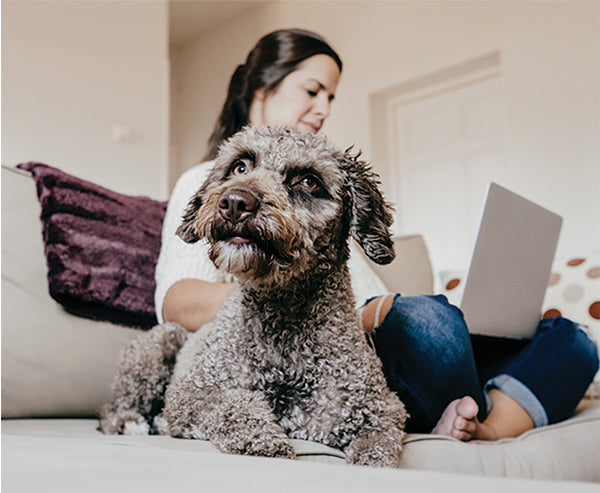
Food allergies in dogs can develop at any age and often go unnoticed for months. Many owners confuse the symptoms with general health issues or seasonal changes. However, consistent signs that point to a food allergy can be identified early with the right knowledge. Knowing what to look out for, and understanding how diet affects your dog’s body, makes it easier to manage.
One of the most effective ways to reduce food allergy risk is choosing a diet with clear, well-sourced ingredients. Clinivet's full range includes dry foods that are formulated with ingredient transparency in mind. Each bag provides complete nutritional details, allowing you to spot potential allergens easily.
What Causes Food Allergies in Dogs?
A food allergy happens when a dog’s immune system overreacts to a specific protein or ingredient. The most common triggers include beef, dairy, chicken, wheat, soy and eggs. Even high-quality foods can trigger a reaction if your dog is sensitive to a particular component. That’s why it’s essential to monitor their behaviour and physical health if you suspect an issue.
It’s important not to confuse food allergies with food intolerance. Allergies involve the immune system and often result in skin or ear problems. Intolerances usually cause digestive upset without the immune response.
Common Symptoms to Watch Out For
The signs of food allergies in dogs often affect the skin, ears and stomach. Here are the most frequent symptoms:
Skin and Coat Changes
● Itching and scratching, particularly around the face, paws or belly
● Bald patches or hair thinning
● Red, inflamed or dry skin
● Recurrent hot spots
Ear Issues
● Frequent ear infections
● Dark discharge from ears
● Strong odour from the ears
● Head shaking or scratching at the ears
Digestive Problems
● Diarrhoea or soft stools
● Vomiting
● Gas or bloating
● Increased bowel movements
These symptoms may appear individually or together. If they persist for more than a few weeks, it could point to a food allergy.
Behavioural Signs to Note
Some dogs show changes in behaviour when experiencing discomfort from allergies:
● Restlessness
● Licking or biting paws excessively
● Reduced appetite
● Low energy or irritability
Dogs can't explain their discomfort, but their actions can speak clearly. Keep an eye on patterns that repeat.
How Food Affects Skin and Gut Health
A poor diet or one containing allergens can disrupt your dog’s skin barrier and digestive lining. This makes them more likely to develop further allergies, infections or long-term sensitivities. Quality nutrition supports the immune system and reduces inflammation.
Clinivet’s hypoallergenic and grain-free options avoid common allergens and use clearly defined ingredients. These diets can help dogs with existing allergies or prevent issues before they start.
Why Ingredient Transparency Matters
Reading labels is essential when dealing with allergies. Vague terms like "meat derivatives" or "animal by-products" make it hard to identify the problem. Look for named ingredients such as "chicken," "salmon," or "rice."
Clinivet recipes use specific ingredients that are easy to track. This helps pet owners and vets work together when diagnosing food sensitivities. The fewer unknowns, the easier it is to manage your dog’s condition.
The Role of Omega Oils in Allergy Support
Dogs with food allergies often suffer from dry, flaky skin. Omega 3 and 6 fatty acids help reduce inflammation and restore skin health.
Omega 3:
● Soothes itching and redness
● Supports a healthy coat
● Aids immune response
Omega 6:
● Strengthens the skin’s moisture barrier
● Reduces dryness and flaking
● Promotes healthy coat growth
Clinivet includes essential oils from fish and linseed in their dry adult dog food, supporting both skin and immune health. This helps dogs recover from allergy-related symptoms faster.
Trying an Elimination Diet
If your vet suspects a food allergy, they may recommend an elimination diet. This involves feeding your dog a diet with limited ingredients for 6–8 weeks. If symptoms improve, you reintroduce other foods one at a time to see what causes a reaction.
Use a single-protein, grain-free food such as Clinivet’s grain-free chicken recipe. During the trial, avoid all other treats or table scraps. Record any changes in behaviour or health. Always carry this out under your vet’s guidance.
The PDSA also advises regular vet check-ups during this process to ensure your dog stays healthy.
When to Speak to Your Vet
Not all itching or upset stomachs are caused by food. Environmental factors, seasonal allergies or parasites can cause similar symptoms. If you’re unsure, consult your vet before changing your dog’s diet. They can rule out other conditions and advise on the best food trial approach.
Look for a vet with experience in canine dermatology or nutritional care for more tailored advice.
Our Advice
Food allergies can cause long-term problems if left unmanaged. By recognising the signs early and choosing a clear, nutritious food like Clinivet, you can support your dog’s health and comfort. Ingredient transparency and quality nutrition are key tools in protecting your dog from further reactions.
For dogs with ongoing allergies, consider a clinically tested diet that supports skin and gut health.
If you're unsure which Clinivet recipe suits your dog, contact the team for advice. They can guide you through the best options based on your dog’s symptoms and dietary needs.
